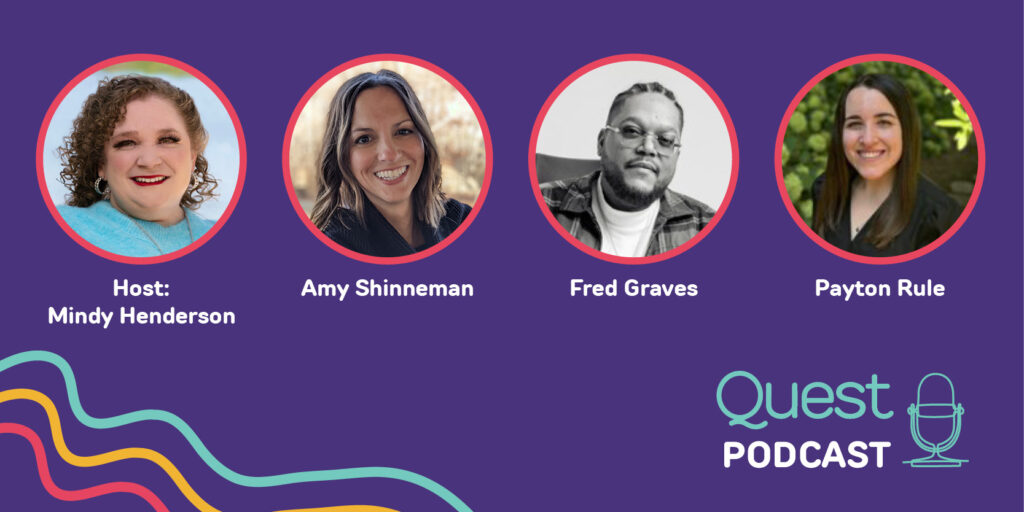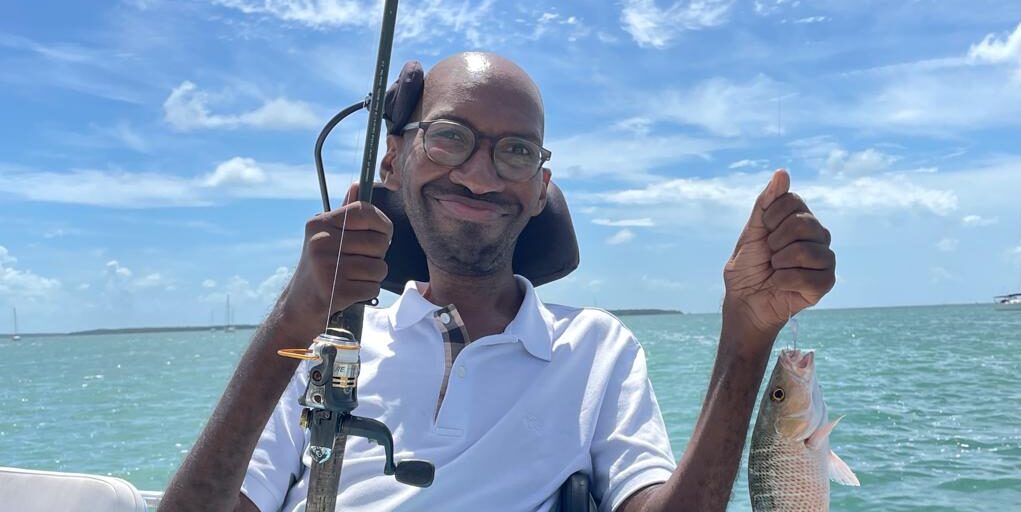
Quest for Success: Ira Walker
By Rebecca Hume | Wednesday, November 30, 2022
5 Second Summary
Quest for Success explores the different paths that individuals with neuromuscular disease have taken to reach their potential and pursue dreams. This series spotlights individuals from our community and shares their journey to independence and accomplishment.
As the Muscular Dystrophy Association (MDA) continues our commitment to empowering people living with neuromuscular disease, we are excited to present our 2022 blog series: “Quest for Success”.
Success looks different to everyone and this monthly blog will detail the different paths that individuals with neuromuscular disease have taken to reach their potential and the steps they took to get where they are today. Each month we will spotlight one individual from our community and share his or her journey to independence and accomplishment. We hope that these stories empower and inspire our readers to unlock the possibilities in their own lives…because the possibilities are limitless.
HR Specialist Shares His Creativity, Passion, and Enthusiasm
Ira Walker knows that living independently with a disability takes planning, hard work, determination… and a bit of creativity. The 37-year-old human resources (HR) professional was born with spinal muscular atrophy (SMA) Type II and diagnosed at 12 months old. His enthusiasm for living life to the fullest and his unwavering belief that he can achieve anything that he sets his minds to have served him well on his quest for success. Ira attended college at the University of Missouri, joined the workforce and is employed fulltime in the HR field, lived independently managing his own caregivers, and even moved across the country to pursue a lifelong dream of living in Florida.
Early goals and lifelong motivation
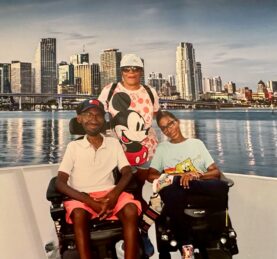
Ira with his mom and sister.
“I always knew that I would work full time regardless of what anyone told me, regardless of what any type of statistic said,” Ira shares of his early plans to be an employed and independent adult. “I always said that I wanted to work in a professional environment. I wanted to work in corporate America and be someone continuously climbing the ladder. I knew that I could do that by doing whatever it would take to modify my environment, be a good communicator, let people know when I need help, be clear… that is how I was able to move my way up and really obtain my goals that I set for myself early on. Just by continuously working hard and motivating myself.”
Ira’s sister, who is six years older than him, was also born with SMA. In his opinion, she provided him with a built-in role model to show him from the very beginning that anything was possible even with a disability. He shares that she paved the way for him, acting as a guide that he could follow throughout primary school, college, and as an adult in the workforce. By watching her, Ira had an early mentor to show him how to navigate the terrain of life with a disability.
Ira’s parents taught both of their children that having a disability was not a barrier to success. They instilled the mindset that everyone is capable of success if they work hard and continuously motivate themselves to succeed. Armed with that powerful viewpoint and supportive parents to advocate for his needs, Ira was an active student and pursued a variety of interests while attending school.
School accommodations and extracurriculars
One of the biggest accommodations that Ira required to attend school was enrollment in an accessible school building. At the time that he attended elementary school, the school near his home was not wheelchair accessible and had steps into each classroom. Because Ira started using a power wheelchair when he was 6 years old and his zoned elementary school was not accessible, he attended a newly built elementary school on the other side of his district. The district had made the same accommodations for Ira’s sister. Ira and his parents also worked with the school to arrange for a wheelchair accessible school bus to transport Ira not only to and from school, but to and from extracurriculars as well.
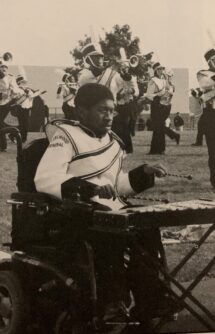
High school yearbook photo of Ira in the marching band.
A lover of all that life has to offer even at a young age, Ira became involved in multiple extracurricular activities and pursued a variety of passions. He joined the band in fourth grade, playing the clarinet through elementary school and middle school. In high school, he wanted to be part of the marching band but could not navigate the clarinet and his wheelchair at the same time on the field. Not one to allow a barrier to stop him, Ira switched instruments and learned to play the xylophone so that he could participate from the percussion pit during game-time performances.
Ira is also an avid sports buff. With a love for football, basketball, and baseball, Ira wanted a way to be involved with his high school sports teams even though he could not physically play the game. He became the student manager for his high school baseball team. Ira managed the team’s stats and controlled the score board at home games. The school also provided accessible transportation so that he could travel with the team and attend away games.
In college, Ira met with the university’s center for students with disabilities and ensured that his classes would also be accessible for him. He worked with the university to establish a schedule that allowed time for travel between classes and routes that were wheelchair accessible. He had positive experiences obtaining accommodations at every level of education and believes that workplaces could be more accessible if they followed the same philosophy of educational institutes.
“I actually think that the accommodations growing up with school – public and college – it was easier to get accommodations in school than in the workplace,” Ira says. “Education has a philosophical idea that there shouldn’t be any barrier for education, where in the workplace it seems that the assumption is for someone (the employee) to figure it out themselves. I feel that schools embraced inclusion and were more willing to accommodate.”
The interview process and finding a role that works for you
After college, Ira began interviewing for positions in the corporate healthcare sector. For him, one of the biggest challenges during the interview process came before the interview even started. Relying on public transportation to get to an interview was stressful as the transportation system was not always reliable. To mitigate that issue, Ira would plan to arrive at interviews incredibly early so that a delay in transportation would not make him late. Ira also chose to disclose his disability prior to interviews by calling to let the office know that he uses a wheelchair and inquiring if the building had automatic doors or an elevator. He also spoke candidly about his disability during interviews.
“My take, how I approach it, I was up front with people about my disability during the interview process because I always felt that, even when making new friends or becoming part of a new organization, I like for people to understand the disability that I have,” Ira says. “I always tell people clearly that I have muscular dystrophy. I disclose that and I let them know what type of abilities I have and the areas in which my disability may cause me to struggle.”
Ira thinks that open honesty is appreciated and allows people to feel more at ease asking what he might need to reach his highest potential. He encourages others to be up front with potential employers, and people in general, because it creates an opportunity to dispel latent assumptions that people with disabilities are not able. “I let people know up front that my disability does not hinder me from doing anything. I need a wheelchair for mobility, but I am able to work just as hard as anybody else,” Ira says.
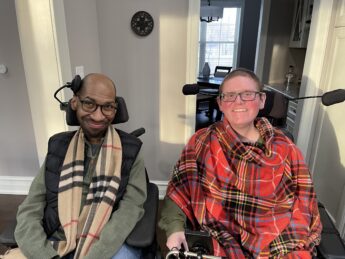
Ira with friend and fellow community member, Troy Biernbaum.
After navigating the interview process and working a few positions directly after college, Ira found a role in which he excels. Ira currently works in the HR department of the Centene Corporation, a national company that provides medical benefit management in partnership with Medicare and Medicaid healthcare plans and employs over 70,000 employees. He has been with Centene for six years and previously spent five and a half years in a similar role at a different company. For each of those positions, Ira was recommended to the companies’ hiring teams by colleagues who had worked with Ira and admired his dedication, work ethic, and positive attitude.
Accommodations to excel
When Ira started his current position, he met with his employer and spoke about what he needed in order to complete his tasks at his highest level of ability. Noting that working for a larger corporation sometimes has more steps to the accommodation process than a smaller company, he advises others to be proactive in stating their needs and to follow up to make sure that progress is being made in the approval and provision process. Prior to the pandemic, his main accommodation was the request to work from home during inclement weather, which his company granted. He also requested and received a raised desk for his office.
“I think that the key for anyone entering the workplace is to let those accommodations that you need be known up front and early, and then follow up with HR,” Ira says. “And it is important to let it be known that you are requesting these specific accommodations so that you can be effective and valuable in your role.”
Since the pandemic, Ira’s position has been entirely remote. As many companies have shifted to remote work, the opportunities for adults living with disabilities to enter the workforce with limited accommodations have increased. This shift also provided Ira with the opportunity to fulfill his lifelong dream to move across the country and live in Florida.
Independent living
Adjusting to the change in culture and climate moving from Missouri to Florida has been an adventure for Ira. He enjoys exploring his new surroundings, finding his place in his new community, making friends, and staying active.
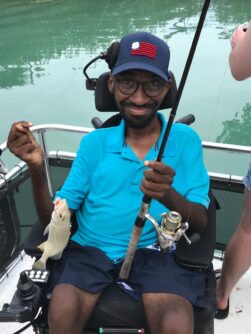
Ira enjoying life in the Florida Keys.
While transportation caused frustration during the interview process, Ira was able to alleviate that stressor by purchasing a van once he joined the workforce. He procured a grant through his local vocational rehabilitation office, and they financed the modification of his van. Every state offers occupational and educational rehabilitation services to assist people with disabilities in pursuing educational and occupational goals. Ira shares that the ability to independently drive himself anywhere that he needs to go changed his life both professionally and socially. He encourages anyone living with a disability to explore and pursue options for owning an accessible van. “Don’t let anyone tell you that because you are in a wheelchair you can’t drive,” he says. “Explore those options and work with OVR to see if there is funding that you qualify for to get a driving evaluation and see if there is funding for a modified vehicle. While it can be a lengthy process, it can come to fruition. And having that level of independence…there is nothing like it.”
Another huge aspect of independent living, and an especially pertinent consideration for those entering the workforce, is the need for home support and caregivers. And the potential loss of state funded programs for caregivers is a serious concern for many adults living with disabilities, Ira included. A year after he began working at Centene, he was able to afford to rent his own apartment and live on his own. While he celebrated this achievement, he also experienced a set back from that success: he lost his healthcare coverage through the state that provided personal care. While the larger solution to this national issue lies in policy reform, Ira shares that he was able to find creative ways of living by cutting other costs, eating like a college student, and arranging his hours to meet his needs in the most efficient schedule. While paying out of pocket for care was an enormous cost, Ira says that the sacrifices he made were personally worth it in order to pursue his career goals.
Ira advises others who might be hesitant to enter the workforce for fear of losing healthcare coverage to explore options. He recommends working with a social worker or care manager that can help navigate the various programs available in each state. Since his move, Ira is currently staying with family members and exploring various programs in Florida. One program that he is looking into is the James Patrick Program, a program offered in Florida that provides a certain amount of reimbursement for caregiving expenses to those who no longer qualify for Medicaid.
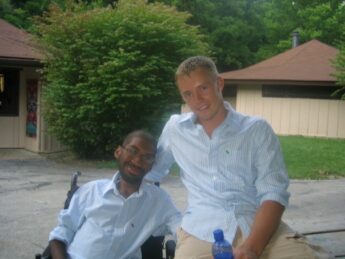
Ira with MDA Camp Counselor in 2006.
“I would never encourage people not to work. I can only speak on my behalf, but not working would not work for me because I am an extrovert and a highly motivated person,” Ira says. “I have to be doing something and be involved or I am not fulfilled in life. Everybody is different and you have to approach the situation that works best for you. But you can do anything that you want to do.”
The power of community and mentors
Ira places a high value on the support and reinforcement that he has received from his family, community, mentors, and MDA Summer Camp. His belief that he can achieve anything in this life is deeply rooted in the experiences that he had at MDA Summer Camp. He attended camp from the age of 6 until graduation, and credits his experiences there with motivating him to excel. Sharing that his best summertime memories from his childhood took place at camp, Ira says, “All of the individuals, volunteers, and older campers were motivators. They encouraged me to excel and to never allow my disability to become a reason not to succeed.”
As an adult, finding mentors in the workplace and in the neuromuscular community is equally important. Working with employers and colleagues who value his skillset and focus on his abilities instead of his disability allows Ira to excel in his professional role. And finding friends and mentors in the community has brought joy and camaraderie to Ira’s personal life. Upon moving to Florida, he met and befriended Jose Flores, an inspirational speaker and author, who also lives with SMA. The two met at an SMA event and quickly became friends. Ira is incredibly grateful for the opportunity to get to know and connect with someone in his community who not only has similar experiences and a shared passion for growth, but who Ira admires and feels inspired by. He recommends Jose’s book, Don’t Let Your Struggle Become Your Standard as an incredibly resource and guide for others living with a disability.
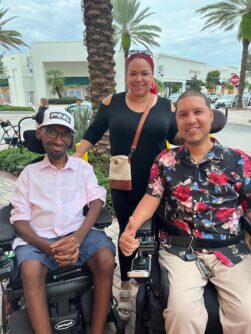
Ira with Jose Flores and his wife
Ira wants everyone in the neuromuscular – and greater physical disability – community to know and believe that they are capable of success.
“Whether a young adult or a grown adult, don’t allow someone to tell you that you can’t live a productive, value-added life. You can be just as productive and independent as anyone else without a disability,” he says. “You just have to find ways to be creative. If you know that you want to be independent, to work, to get married, to have a house… find ways. It may not be easy, but it is possible.”
Next Steps and Useful Resources
Next Steps and Resources:
- Find an Office of Vocational Rehabilitation in your state.
- Learn more about MDA Summer Camp.
- Check out Jose’s book: Don’t Let Your Struggle Become Your Standard.
TAGS: College, Community, Education, Employment, Ira, Quest for Success, Year of Independence
TYPE: Blog Post
Disclaimer: No content on this site should ever be used as a substitute for direct medical advice from your doctor or other qualified clinician.



